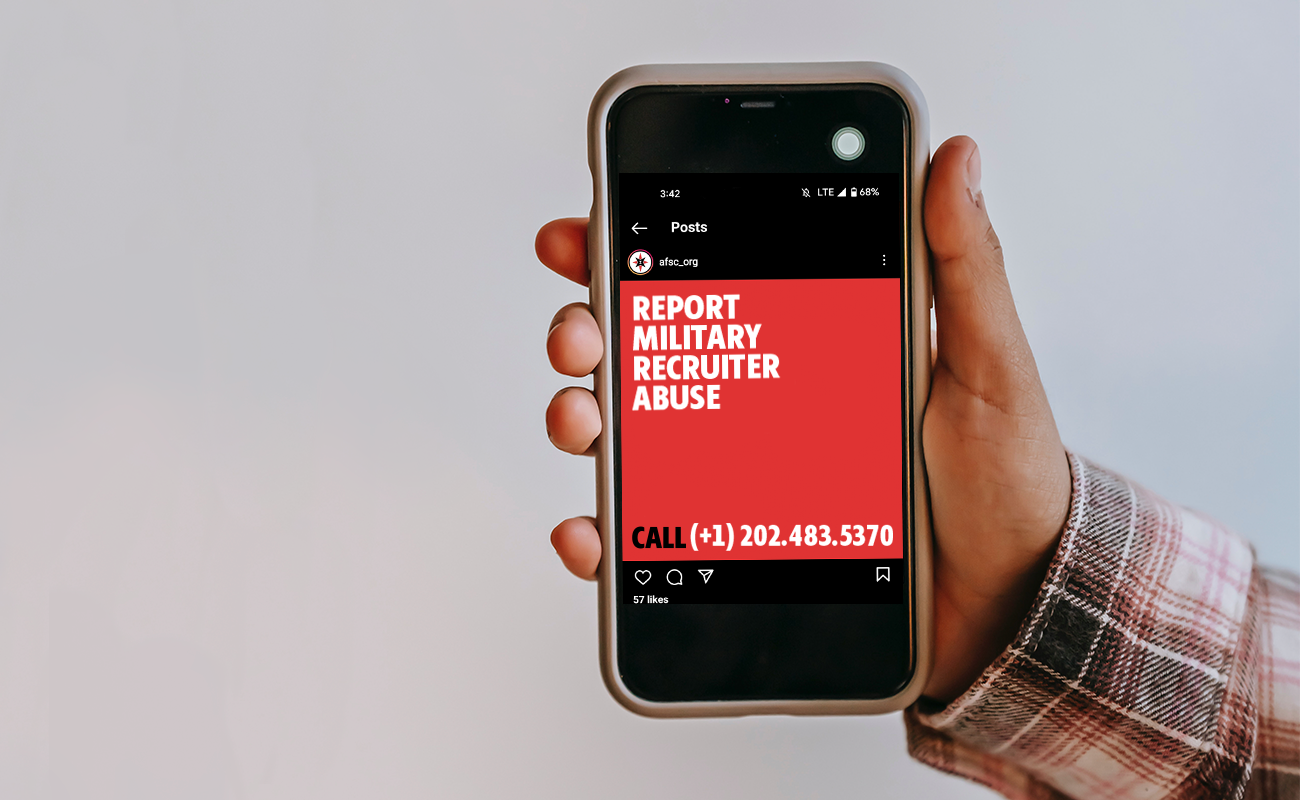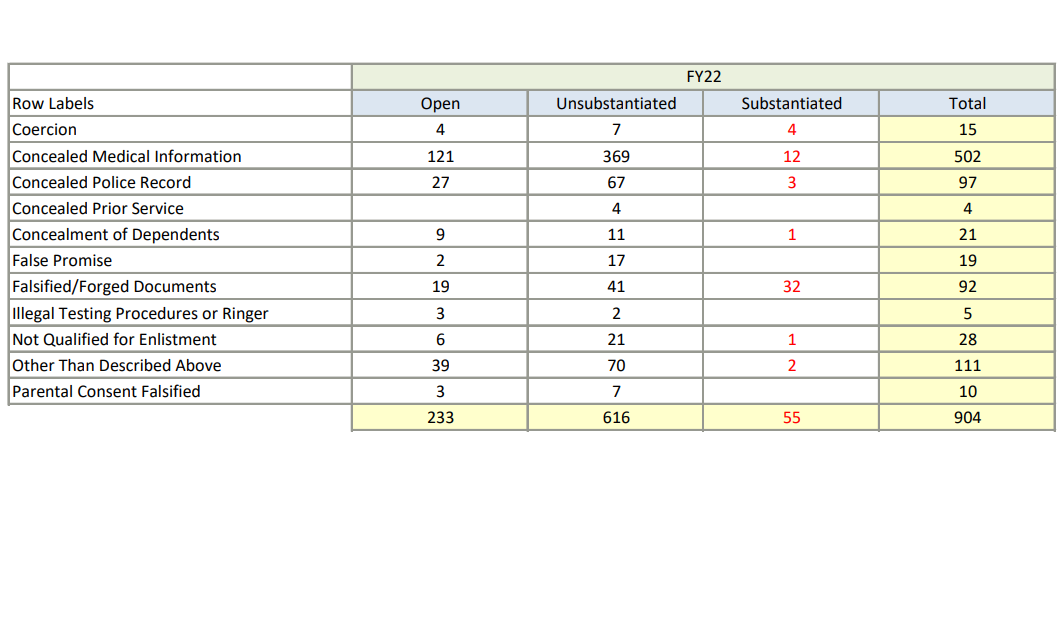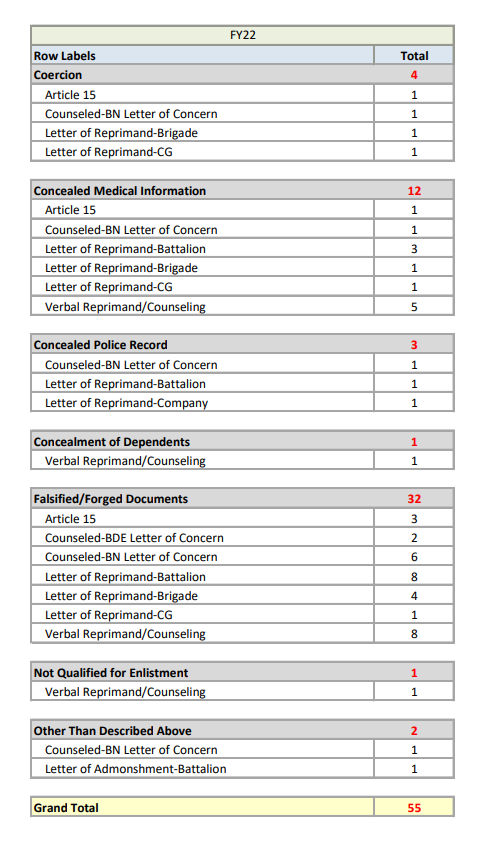
This article was originally published in the OnWatch Spring 2023 edition.
In April 2022, the American Friends Service Committee (AFSC) reopened its “Military Recruiter Abuse Hotline” amid an uptick in calls from young people experiencing military recruiter misconduct. Through the hotline and webform, we are collecting stories over the course of a year from people who have experienced a wide range of misconduct and abuse from military recruiters. This information helps us identify existing barriers to hold recruiters accountable and advocate for change to stop these abuses.
Since launching the hotline, we have received over 100 phone calls, emails, and form submissions. These stories from the public include allegations of a wide range of misconduct and abuse from military recruiters.
TRENDS IN MISCONDUCT: THE STORIES WE HEARD
By far the largest category of reports is harassment, including verbally, on social media, and via text. Of the more than 100 reports AFSC received, 34 were reports of harassment. People have reported that recruiters have repeatedly contacted them after being asked to stop and, in some cases, have escalated conversations after someone says “no” or expresses negative opinions about military service.
Here are some examples:
• In one case, the recruiter called the person “old and fat.”
• Another recruiter sent over 70 text messages in a row, presumably to irritate the recipient with the frequency.
• In other cases, recruiters disparaged the person’s current job, family, or character.
• In two instances, recruiters threatened to show up in person at the potential recruit’s house, providing proof that they knew the person’s address after the person said they weren’t interested. In one of these cases, the person reporting the recruiter says that a text of their home address was followed with, “I’m pull up on ya and then I want you to keep that same energy boy.”
• We’ve also heard from two people involved in retail businesses where employees and customers are being approached by recruiters inside stores.
The second most common complaint received, with 19 reports, is that recruiters are providing misleading and incorrect information to potential recruits. They are told by recruiters that they will be sent to a specific location, be given a particular job, or qualify for certain benefits - and ultimately are not given those things. In several cases, the misinformation was intended to pressure a quick signing. Recruiters claimed that if the person did not sign then and there, and with that particular recruiter, they could never join the military. Notably, two of the reports we received specifically named immigration status as one of the reasons they were targeted for this misinformation.
The third largest category, with 12 reports, is that recruiters encouraged individuals to cheat, lie, or misrepresent themselves in the recruitment process. This is overwhelmingly done in relation to medical records:
• In one case, a young man was told to stop taking medication by a Marine recruiter, to hide his medical history. He then took the man to a sauna to sweat out the medication, and to a pharmacy to sign papers hiding his medical records.
• In two cases, the recruiters misstated the impact of the Genesis medical records system. The recruiter suggested that medical information shared before the system took effect wouldn’t be included or would be held to different standards.
• Some of the people reporting this type of misconduct said they were separated from the military as a result, were re-injured or experienced other medical consequences, and/or experienced stress about their lies being discovered.
While we received smaller numbers of complaints that were not harassment, misleading info, and misrepresentation, many of those that fell outside of these categories were incredibly concerning. Several people reached out to share about inappropriate relationships between recruiters and young people that they were trying to recruit, or other sexual misconduct. In addition to the stories shared by potential recruits, we also received two notes from recruiters themselves - including accusations of abuse by their higher-ups, or having heard admissions from their commanding officers about misconduct.
Several anecdotal trends emerged in the reports received over the past year. In many conversations, people noted that they had strong pro-military views or a strong interest in joining the military but were disheartened by their experiences with recruiters. Many considered changing their minds about military service because of the misconduct they experienced.
There was also a lot of fear and confusion about reporting misconduct directly to the military. Some were worried about getting themselves, or other recruits, in trouble for reporting recruiters for encouraging them to lie about their medical records, because it could expose the lies of those who had followed the advice. There is little information available to the public on how reporting processes work, and their own legal and professional liability for actions undertaken on the advice of recruiters.
ARMY RECRUITING COMMAND DATA
Misconduct by military recruiters is recognized as a problem by the Department of Defense, which receives complaints, conducts investigations, and occasionally doles out consequences. At the end of 2022, I requested data on army recruiter misconduct reports through a FOIA request to the U.S. Army Recruiting Command (USAREC). I received the numbers from FY2020, FY2021, and FY2022, as well as the actions taken in those cases.
In FY 2022, the USAREC office that handles complaints received 904 total complaints about army recruiters. The largest category, with 502 complaints, was “concealed medical information.” There were also 92 reports of falsified/forged documents, 97 reports of concealed police records, and 15 reports of coercion, among other numbers.
But those numbers dwarf the numbers of reports that the army ended up taking action. For example, only 12 out of the 904 complaints about concealed medical information were considered “substantiated,” just 1.3% of the total.
Anecdotally and based on conversations with USAREC, these low substantiation numbers for medical information concealment are largely due not to the merits of the complaints, but to the lack of written evidence. Compare this 1.2% substantiation rate to the 34.7% substantiation rate for “falsified/forged documents,” which by their nature include physical records of the misconduct.
Data from USAREC on recruiter abuse reports in Fiscal Year 2022:


RECOMMENDATIONS
As we approach a year of story collection, it’s clear that young people in the United States are facing incredible amounts of misconduct at the hands of recruiters. They are also confused about how to report these infractions and anxiety about the consequences they may face after listening to recruiter’s instructions or reporting the abuses.
The military must take action to keep young people safe from recruiters, and to ensure that people joining the military have clear, accurate information about what they are signing up for.
Here are two steps the military should take toward that goal:
1. Make clear their structure for reporting misconduct to the public.
The public should be able to easily search online for the relevant contact information and their rights in relation to recruiters. They should also be given clear information on what kind of materials and evidence should be collected in order for the military to take action on an accusation of misconduct. The official USAREC guidance coming out of Ft. Knox, for example, lists the “usarmy.knox.usarec.mbx.hq-rsd-improprieties@mail.mil” email address for reports of misconduct, but this guidance is not readily accessible by the public and a test general inquiry I made to this inbox was never answered. The “Commander’s Hotline” listed on the USAREC website is described generally and does not include information about the potential implications of reporting using this line.
2. Provide clear guidance to potential recruits about the personal and professional repercussions for following the advice of recruiters.
This is especially relevant for cases in which the recruiter tells the recruit to lie about their medical history, and the recruit complies. For many of the reports we’ve received, young people are nervous to go through official military channels, because of potential retaliation or because they followed recruiter’s advice and now feel complicit in the misconduct - even if they did not fully understand what was happening. When potential recruits are given bad advice by recruiters, whether that is to lie about their medical history or otherwise, they should be confident that reporting the misconduct will not have repercussions for them or other people in the same situation. They should also be confident that the recruiting office will be held accountable.
No one should ever face abuse or misconduct from military recruiters. Unfortunately, a year of operating the Military Recruiter Abuse Hotline has shown us that it is all too common for young people to face harassment, lies, and other misconduct as they interact with recruiting stations. As organizations and individuals continue to work to oppose the militarization of youth, it’s important that these efforts include advocacy with the Department of Defense and Congress, to ensure that young people have the information and tools they need to keep themselves safe from recruiter misconduct.
